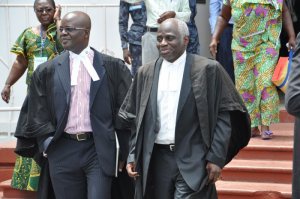As the final day for filling of addresses by both the petitioners and the respondents as ordered by the nine member panel of the Supreme Court hearing the ongoing election petition inches to a close, legal pundits and analyst say the respondents will rely heavily on the allegations of ‘bad faith’ on the part of the petitioners to prove their case.
According to legal luminaries who spoke to The Al-Hajj in separate interviews on conditions of anonymity, both the 1st, 2nd and 3rd respondents have consistently and strongly raised the point of “bad faith” throughout the 46 days that the case has traveled so far, in an attempt to discredit the petitioner’s claims.
Though the petitioners will relentlessly try to demonstrate in their address why the Justices should uphold their reliefs that seek to annul over four million votes, the learned legal pundits predict that the respondents will argue along the lines of ‘bad faith’ to whitewash all the claims by the petitioners.
Citing reasons for this staunch legal projection when the respondents have kept the content of their respective addresses to their chest, a legal luminary, who is well vexed in constitutional law, stated that the respondents in their respective answers to the petitioner’s claims have tagged the petition as an act of bad faith and brazen attempt by the petitioners to find some reason to question the validity of the December 7 and 8 presidential elections after they had lost.
The legal heavyweight explained that in the 1st respondent’s answer to the petitioners’ amended petition filed on February, 26, 2013, the 1st respondent averred that the petition seeking to annul the “eligible votes cast was brought in bad faith.”
“If you have been following the case closely, you will realize that during the cross-examination of Dr. Bawumia, both the lead counsels for the 1st and 3rd respondents made the arguments that the pink sheets the petitioners were relying on were largely from the 1st respondents’ strongholds; that was what prompted Tsatsu Tsikata to try to tender the pink sheet from the Asokwa constituency, a stronghold of the petitioners to prove the case of bad faith.”
“In the case of the 3rd respondent, which is the NDC, they even elaborated on the allegation of bad faith. In their answer to the petitioners’ amended petition, the NDC argued that the petitioners are acting in bad faith and that the petition is frivolous, vexatious and an abuse of the court,” the legal pundit added.
The learned constitutional lawyer quoted a paragraph of the NDC’s amended answer, which reads “The results of the parliamentary elections that were also held on the same days were announced by officials of the second respondent in the various constituencies and showed that the third respondent won 148 out of 275 seats in Parliament, thus attaining a clear majority and that the NPP won 123 seats.
“Members of Parliament, including those who stood on the ticket of the New Patriotic Party, have taken up their seats in Parliament,” the NDC’s response pointed out, adding, “the petitioners cannot consistently claim that the presidential elections were conducted irregularly, in respect of voter verification, for instance while acknowledging the validity of the parliamentary elections on the basis of which members of parliament from their party have taken their seats in Parliament.”
Another legal analyst stated that, the 2nd respondent in their response to the petition and throughout the three month trial, have consistently referred to the petitioner's claims as a “mischievous attempt” to buttress baseless accusations the petitioners made to their supporters and the media.
Collectively, the legal luminaries stated that, drawing from the respondents’ answers to the petition and also following their star witnesses’ evidence-in-chief, and the cross-examination of Dr. Bawumia, “any experienced lawyer worth his sort will know that the respondents’ address will heavily center on the allegations of bad faith to prove their case.”
“Any lawyer following what has transpired in court so far, knows the direction in which the addresses of the respective lawyers will go…they have argued their case in open court and in their affidavits, so from a legal point of view, the respondents’ lawyers have constantly maintained the issues of bad faith as their trump card, and if they succeed in convincing the Justices to uphold their argument, it could rubbish all the claims of ‘over-voting’, non-signing of pink sheets by presiding officers, voting without biometric verification and duplicated serial numbers of pink sheets.”
Another legal opinion proffered by an expert in constitutional law suggested that, though article 64 (1) of the 1992 constitution guarantees the right of any citizen of Ghana to proceed to court within 21 days of the declaration of a presidential election result if he or she feels aggrieved, the testimony of the Electoral Commission, the constitutionally mandated body to manage elections in Ghana, insofar as they don’t conflict with any constitutional provisions and electoral laws, would play a key role in the determination of the petition.
According to the legal expert, Dr. Afari-Gyan’s suggestion in court, which was occasioned by a question from Tsatsu Tsikata, that if the court should uphold any of the reliefs sought by the petitioners, then he would have to apply it to all the 26,002 polling stations indicate the extent to which the respondents are bent on shooting down the various allegations with their “bad faith” trump card.
The only constitutional violation so far, clearly and partly admitted to by the 2nd respondent and to some extent by the 1st and 3rd respondents, was that of unsigned pink sheets by presiding officers, even that, the EC admitted having in its custody only 905 unsigned pink sheets as against the petitioner’s claim of 2,009 unsigned pink sheets”.
Our legal analyst stressed that the issues of presiding officers signing pink sheets is a constitutional requirement under article 49 of the 1992 constitution, but was quick to add that “the difficulty is that, the constitution did not state what will happen in the case of pink sheets not signed by presiding officers”, adding that “it is a matter for determination by the Law Lords.”
In a bid to counter this claim, the respondents are expected to quote article 42 of the constitution which guarantees the right to any citizen of Ghana of eighteen years and above, the right to be registered and to vote.
General News of Wednesday, 24 July 2013
Source: The Al-Hajj

















